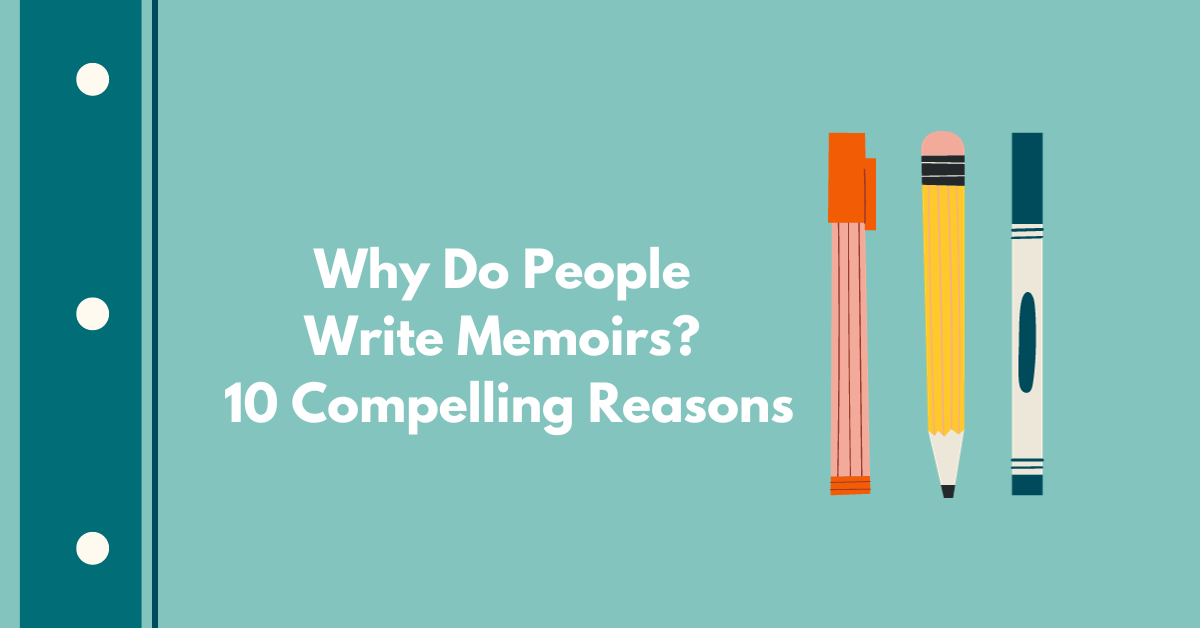Have you ever wondered why we pen down our life stories into the vibrant medium of memoirs?
What’s the allure that draws both authors and readers alike to this intimate form of storytelling?
In this peppy exploration, let’s delve into ten profound reasons that motivate people to write memoirs, all spiced up with relatable examples.
1. Therapeutic Catharsis
A memoir serves as an emotional sieve, allowing authors to process thoughts and emotions.
The act of writing involves introspection, thus leading to healing and growth.
Example: “Eat, Pray, Love”
Elizabeth Gilbert’s memoir serves as a healing journey after a painful divorce, embodying this therapeutic catharsis.
2. Sharing Wisdom and Life Lessons
Many memoirists view their works as platforms to impart both wisdom and life lessons gleaned from their experiences.
They guide, inspire, and caution readers through these lessons.
Example: “The Glass Castle”
Jeannette Walls paints a vivid canvas of her unconventional upbringing, teaching us resilience and forgiveness in the face of adversity.
3. Documenting Important Events
Memoirs often document significant historical or personal events.
They give a firsthand account, making history more accessible and relatable.
Example: “Night”
Elie Wiesel immerses readers into the grim realities of the Holocaust through his experience, ensuring history’s atrocities aren’t forgotten.
4. Entertainment
Surprisingly, entertainment holds a pivotal place as a memoir writing motivator.
Unusual life experiences, woven together, provide an enthralling narrative.
Example: “A Walk in the Woods”
Bill Bryson captivates his readers with his humorous account of hiking the Appalachian Trail, offering pure, joyous entertainment.
5. Family Legacy
Memoirs also act as personal histories for posterity, preserving cherished memories or forgotten stories and passing them down to future generations.
Example: “Angela’s Ashes”
Frank McCourt’s memoir brilliantly records his Irish family history, ensuring their collective memory endures.
6. Speaking Up
Memoirs give a voice to individuals from marginalized or underrepresented groups, enabling them to share their unique stories and viewpoints.
Example: “I Know Why the Caged Bird Sings”
In her memoir, Maya Angelou recounts her journey as an African American woman, shedding light on racial discrimination and creating a powerful narrative.
7. Personal Reflection
Writing a memoir facilitates profound reflection, enabling authors to gain fresh insights into their life and their relationships with others.
Example: “Wild”
Cheryl Strayed recounts her transformative journey hiking the Pacific Crest Trail solo, leading to deeper self-understanding.
8. Creating Empathy and Understanding
Memoirs demystify various life experiences, fostering empathy and understanding among readers, making the world a bit more united.
Example: “Educated”
Tara Westover illustrates her journey from being raised in an extremist household with no formal education to earning a PhD, fostering understanding about non-conventional upbringing.
9. Advocacy
Many authors use memoirs to advocate for a cause, shedding light on issues that are close to their hearts.
Example: “The Diary of a Young Girl”
Anne Frank’s diary sensitizes readers to the trials of living under Nazi rule, advocating against hatred and inhumanity, promoting peace and empathy.
10. Appreciating Life
Memoirs help authors and readers alike to appreciate the beauty and fragility of life, fostering an attitude of gratitude.
Example: “Tuesdays with Morrie”
Mitch Albom shares his weekly meetings with his dying mentor Morrie, underlining the importance of love, compassion, and gratitude.
Wrapping Up: Making Sense of Our Stories
In the end, memoirs allow us to dream, to heal, and to grow, while preserving our legacies for future generations.
They capture our collective human experience, inspiring us to wander our own paths with courage and wisdom.
So, next time you ponder upon why write a memoir, remember this–by shaping our memories into words, we bring forward our truths and reverberate humanity’s collective symphony across the world.
So, what’s your story?

